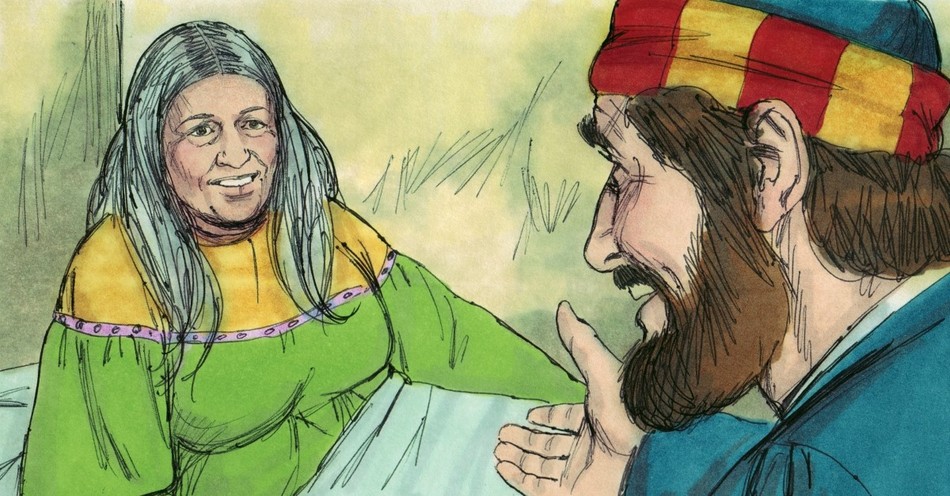Dorcas in the Bible, also known as Tabitha, is a figure mentioned in the New Testament in the Acts of the Apostles (Acts 9:36-43). She lived in Joppa (modern-day Jaffa, Israel) and was celebrated for her charitable works and acts of kindness.
Dorcas was a disciple who devoted herself to good works and charity, particularly helping the poor and making garments for them. Her story is particularly notable because she is one of the few women explicitly described as a disciple in the New Testament. Dorcas is remembered for being miraculously raised from the dead by Peter, which led to many believing in Jesus.
Her life exemplifies Christian service and charity, and she has been venerated as a saint in various Christian traditions.
Who was Dorcas in the Bible?
Dorcas was a disciple of Christ. Both versions of her name mean “gazelle,” a name implying grace.
According to her story recorded in Acts 9, she was always doing good and helping those in need by making clothing and providing for other needs. Known for her kindness and hospitality, Dorcas was appreciated by the people. Her financial status is not shared in the Bible. However, she may have had some wealth as she was able to locate materials to make clothing for people in need. Her unique ministry continues to inspire people today.
Where Did Dorcas Live?
Dorcas was living in the harbor city of Joppa, which was located about 125 feet above sea level. Joppa was known for being the town where the cedars of Lebanon had been sent to be shipped to Jerusalem for use in the temple’s construction. (2 Chronicles 2:16).
The book of Ezra also mentions the rebuilding of the temple.
Joppa is also known as the city where Jonah fled from the presence of the Lord by boarding a ship for Tarshish. Scripture shares that Peter received the vision that prompted him to expand his ministry.
“He said to them: “You are well aware that it is against our law for a Jew to associate with or visit a Gentile. But God has shown me that I should not call anyone impure or unclean.” (Acts 10:28 NIV)
Interestingly, the story of Dorcas and Peter is not the only time the New Testament Bible mentions Peter being in Joppa. In an earlier chapter of Acts, the Bible tells that Peter stayed in Joppa for a while and lived with a tanner named Simon. Tanners made leather from animal hides, which meant tanners routinely touched dead animals and were ceremonially unclean. By Jewish law, clean meant the animal was acceptable for sacrifice and to eat. (Leviticus 11:2-43).
During Peter’s time staying with Simon, God gave him a vision that challenged him to reconsider how he defined “clean” and “unclean.” Shortly after having his vision, Peter was invited to come to the house of a Roman centurion named Cornelius, pushing him to act on what he had learned about cleanliness.
Today, Joppa is known as Jaffa and is known for trade, gardens, and tourism. It is located in the southern area of Tel Aviv, Israel.
The Significance of Dorcas Caring for Widos
In biblical times, being a widow not only meant that a woman’s husband had died. Ancient cultures didn’t usually have safety nets for older people without children. Being a widow meant that if the woman had no children to care for them, they had no one to care for and provide for them.
Since widows were often in need, Scripture frequently mentions them alongside the poor, homeless, and fatherless.
“So that the Levites (who have no allotment or inheritance of their own) and the foreigners, the fatherless and the widows who live in your towns may come and eat and be satisfied, and so that the Lord your God may bless you in all the work of your hands.” (Deuteronomy 14:29 NIV)
Rules and laws were made to protect the widows. In Ruth’s time, widows were granted access to grain fields and were allowed to gather leftover olives and grapes.
“When you are harvesting in your field and you overlook a sheaf, do not go back to get it. Leave it for the foreigner, the fatherless and the widow, so that the Lord your God may bless you in all the work of your hands.” (Deuteronomy 24:19 NIV)
God cares for the widows and requires us to care for them, too. Jesus condemned the Pharisees because they treated widows poorly.
The Bible has specific instructions about caring for widows and widowers, young and old. People of the church are called to be encouragers as to a father, brother, mother, or sister. Respect and honor are to be given to widows.
A strong message tells believers to care for widows, or there will be consequences.
“Anyone who does not provide for their relatives, and especially for their own household, has denied the faith and is worse than an unbeliever.” (1 Timothy 5:8 NIV)
Scripture shares the importance of caring for the widows. As a disciple of Christ, Dorcas showed how to love and care in ways pleasing to God. Through her actions, people could see God’s love and learn about having a relationship with God.
“Learn to do right; seek justice. Defend the oppressed. Take up the cause of the fatherless; plead the case of the widow.” (Isaiah 1:17 NIV)
In helping the widows, Dorcas was listening and obeying God’s commands. Her actions showed that God loves everyone.
What Happened to Dorcas?
Dorcas became sick and died. Her specific illness is not listed in the Bible. After her death, her body was washed and placed in an upstairs room.
The people who knew Dorcas were saddened and sent men to find Peter and bring him to the house where her body was laid. Peter arrived at the house and heard crying. People began showing him clothing and items that Dorcas had made for them.
Peter listened and then sent everyone out of the room. On his knees, he prayed to God and told Dorcas to get up. She opened her eyes and sat up. Peter took her hand and helped her to stand.
Next, Peter called for the believers, especially the widows, to see Dorcas was alive. Why would he focus on the widows? Perhaps Peter desired to show that dying didn’t mean the end. Perhaps he wanted to give hope to the aged.
Because Peter raised Dorcas from the dead, the will of God was fulfilled, and the people of Joppa believed in the Lord.
Was Dorcas the Only Person Raised from the Dead in Acts?
Although Dorcas being raised from the dead was a unique event, she was not the only person raised from the dead named in the Book of Acts.
A young man from Troas named Eutychus was raised by the apostle Paul. The Bible shares that believers had gathered in an upper room to hear Paul speak. As the night continued into the late hours, the man named Eutychus, who was sitting in a window, went to sleep and fell three stories from the structure. He died. Paul threw himself on the young man, bringing him back to life (Acts 20:10)
After Eutychus was brought back to life, he ate a meal with the others.
Can We Learn Anything from Dorcas’ Life?
As with the life of every creation of God, we can learn and deepen our relationship with God.
Looking upon the life of Dorcas, we are reminded that no matter what name we are called, we are uniquely gifted by God. Dorcas had the gift of hospitality shown in how she cared for others.
Our God-given gifts may change from time to time according to God’s plan for our lives.
Dorcas made clothing to give to widows and people in need. We can share what we have with others, even if we don’t have much to give.
The life of Dorcas also shows us that nothing is impossible with God. He equips His followers for the ministry and to lead others to Him.
Dorcas eventually died, yet from her being raised from the dead by Peter, we can rest in the knowledge that God is in control.
Women had significant roles in furthering the ministry of Jesus. From Eve in the garden to the Virgin Mary to Dorcas being raised from the dead, many women in the Bible fulfilled God’s promises in various ways. God has a plan for each person. His plan is always best.
In His Name,
Melissa Henderson
Photo Credit: © Getty Images/BibleArtLibrary

Melissa is the author of Licky the Lizard and Grumpy the Gator. Her passions are helping in the community and church. Melissa is an Elder, Deacon, and Stephen Minister.
Follow Melissa on Facebook, Twitter, Pinterest, and at https://www.melissaghenderson.
This article is part of our People of Christianity catalog that features the stories, meaning, and significance of well-known people from the Bible and history. Here are some of the most popular articles for knowing important figures in Christianity:
How Did the Apostle Paul Die?
Who are the Nicolaitans in Revelation?
Who Was Deborah in the Bible?
Who Was Moses in the Bible?
King Solomon's Story in the Bible
Who Was Lot's Wife in the Bible?
Who Was Jezebel in the Bible?
Who Was the Prodigal Son?




